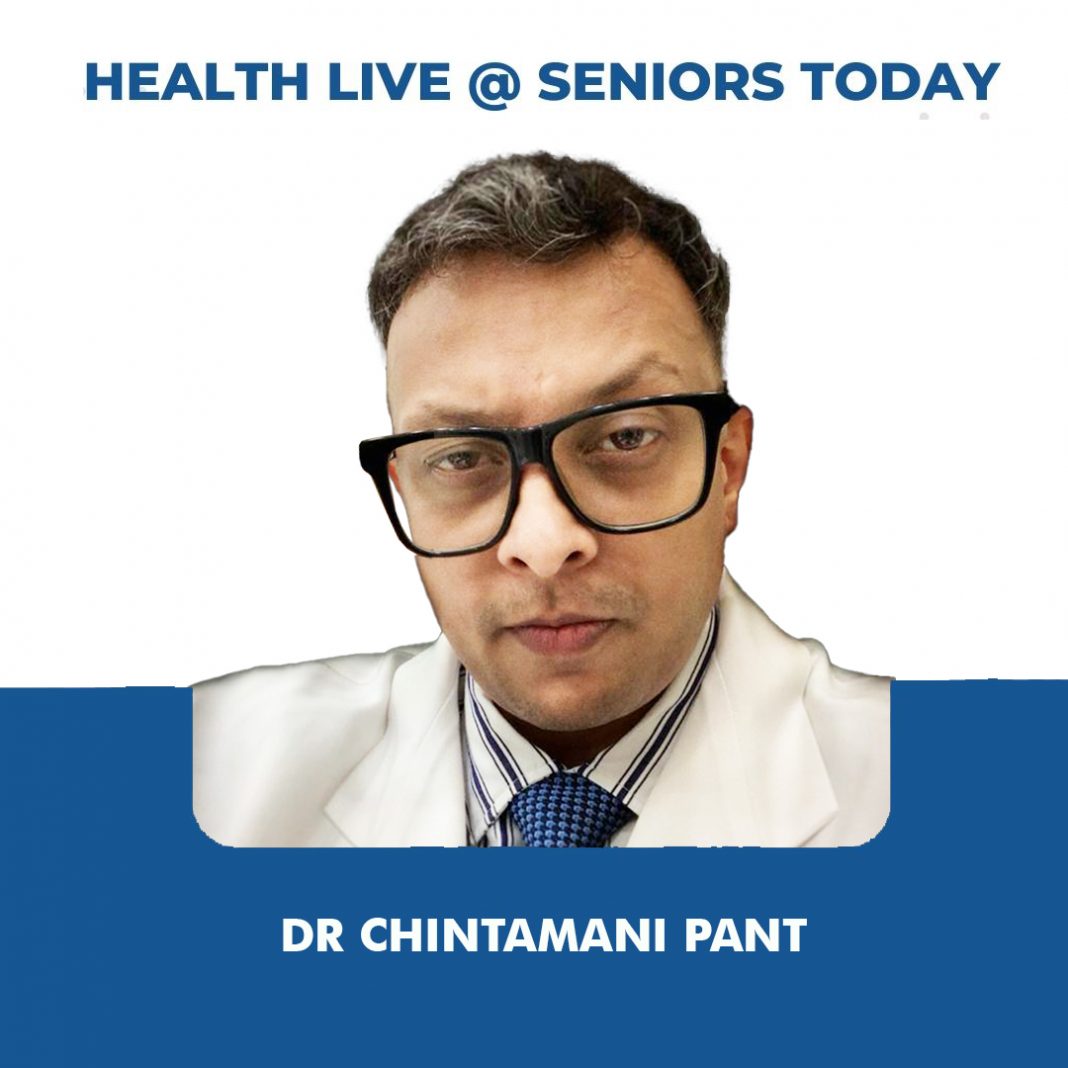On 14 Jan, 2022, Health Live @ Seniors Today hosted their weekly Health Live webinar. This week we hosted Dr Chintamani Pant, a leading dentist, implantologist and orthodontist based in Mumbai to talk on answer questions on Dental Care for Seniors.
About Dr Chintamani Pant
Dr Chintamani Pant is a leading dental surgeon practising in Mumbai. A graduate from the Dr DY Patil Dental and Medical College, Navi Mumbai with a Master’s degree from Sydney, Australia, Dr Pant has also done oral implantology advanced surgical courses from India, Portugal, Korea, Germany etc. He has trained and studied lasers in dentistry from biolase in Australia . One of the very very few dentists using a hard and soft tissue laser machine in regular practice.
The general health of the person affects the oral dental hygiene and health of the individual as well.
By the age of 60, we have invariably had a lot or at least some dental work. It is important to maintain your dental health and hygiene along with all the dental procedures.
Some common problems/ issues seen/faced by the seniors:-
- Xerostomia- dryness of the mouth. This is an age related phenomenon.
- As we grow older one tends to suffer through other ailments as well which leads them to take medicines which can also have some side effects, these can include staining of the teeth which is most commonly seen in individuals who take iron supplements or mutli-vitamins.
- People tend to believe that excessive or aggressive brushing can help in removing the stains which in turn starts wearing off the enamel which further leads to sensitivity.
- Some people have a habit of subconsciously clenching and grinding their teeth which can lead to wearing off of the teeth; once the enamel layer of the teeth wears off, the teeth start to get a little sensitive. Once the individual is made aware of the habit either by a dentist or a close one, the dentist can help you identify the cause for it. There are certain removable protective gear that one can wear while going to bed to avoid subconsciously eroding the enamel.
- Drug induced gingivitis. It can either involve just a couple of teeth or it could be general in the whole mouth.
- Diabetes mellitus type II is directly linked to dental and gum health. As we know, diabetes causes a delay in the process of healing. A patient who is also suffering from DM Type II should pay a visit to their dentist at least once in every 6 months, regardless of whether you have a dental problem or not.
- Bleeding gums is caused most commonly due to gingivitis, which is inflammation of the gums. This can be caused due to aggressive brushing or food getting stuck in your gums; this can lead to local inflammation of the gums. As we progress in life, our mouth also undergoes a few changes. There are gaps that form between our teeth. This can cause food to get stuck in our teeth more easily and frequently. There are procedures like caps, crowns and bridges that can help in closing these bridges.
- Receding gums- these can occur due to vigorous brushing
- Brittle teeth due to acid reflux
- Ageing women going through a menopause tend to suffer from a lot of dental problems during that course of life
Dental problems are such that they are not tended to unless they start causing problems. This leads to the patients reaching the dentist when the disease has progressed.
All procedures have a shelf life, which is why maintenance of the teeth after a procedure is important. If not, it can lead to tooth decay or neck breakage which can ultimately require a tooth extraction.
Dental practices for healthier teeth and gums:-
- An emphasis should be made on maintaining your teeth that have undergone procedures
- Brush your teeth as gently as you can. It’s like brushing paint on paper, the more rigorously you brush, the higher are the chances of you tearing the paper.
- Rinsing your teeth is very important.
- Massaging your gums helps reduce any inflammation in the gum, if any.
- Floss sticks, floss threads, interdental brushes help in flossing by reaching places where your brush cannot reach. Avoid using a wooden or dental toothpick by all means.
- Do replace all missing teeth. When you have missing teeth, eating becomes a problem, even though you might get used to eating in a certain way. Because having missing teeth leads to improper chewing, mastication and breakdown of food in the mouth. Missing teeth can also lead to an increase in the gaps between the other teeth.
You can replace your missing teeth with implants, bridges, dentures, etc.




